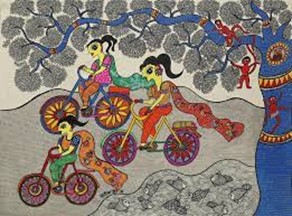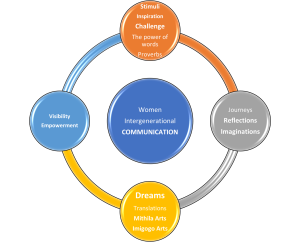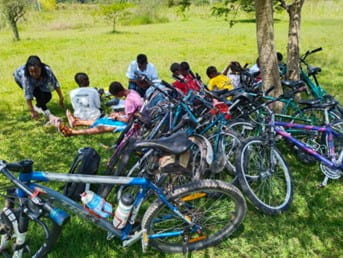Latest posts
- Curricula: Mithila art-focused local curriculum in Nepal 2 July 2025
- Register now: MAP International Online Conference 2025 1 June 2025
- Policy brief: Gira Ingoma book and policy brief: “The Culture We Want, for the Woman We Want” 28 November 2024
- Manuals and toolkits: GENPEACE Children’s Participation Module in the Development Process 13 November 2024
- Journal article: [Working Paper] Gira Ingoma – One Drum per Girl: The culture we want for the woman we want 30 October 2024
- Curricula: Beyond Tradition: Psychosocial Model 30 October 2024
- Curricula: Beyond Tradition Module: Revitalizing Lenong as a Model for Teaching Betawi Arts 30 October 2024
- Curricula: Beyond Tradition: Lenong Revitalisation as a Model for Teaching Betawi Cultural Arts 30 October 2024
- Beyond Tradition Lenong Performance “RAWR…! Kite Kagak Takut” 30 October 2024
- Journal article: [Working Paper] Facing Heaven – Déuda Folklore & Social Transformation in Nepal 30 October 2024
- Curricula: Building Community Curriculums 24 October 2024
- The Magic of Theatre Project Documentary 24 October 2024
Picturing the Past, Present, and Future in the imaginations, dreams and journeys taken by young women in Nepal and Rwanda: An introduction
26th April 2023
Author
Introduction
There is a synergy in the mission of both Janaki Women Awareness Society (Nepal) and Uyisenga Ni Imanzi (Rwanda) in that they exist as Civil Society Organisations (CSOs) for empowering the health, wellbeing and lives of women. Both organisations will work together on a unique international project that will apply the MAP philosophy of arts-based communication structures facilitated between young people and policy makers, with a view to contributing to social, citizenship and education policy discourses.
Theoretical Framework
The intellectual foundation that gives the theoretical framework to our study is exploring, examining, discussing and reflecting on how gender based cultural proverbs have been passed across from generation to generation in both countries, and generally in their articulating a negative portrayal of women’s representation in society at all stages of their lives (Bishwakarma, 2020; Niyonshima, 2020). For example, in examination of Rwanda, Niyonshima (2020, p.12) provides lists of proverbs where women are considered as inferior, worthless and weak people in society:
- Ntaa nkokôkazi ibîka isaâke ihâri. (A hen cannot cluck when a cock is around)
- Uruvûze umugorê ruvuga umuhoro. (A word of a woman is followed by a machete)
- Umukoôbwa w’îgicûucu yiirahiira imfîizi ya sê. (A foolish girl compares herself to her father)
- Umugorê w’înkoramwuuga, abishiima yîikoze muu nda. (A professional witch ends up in killing her own children)
- In examination of Nepal, Bishwakarma (2020) produced a survey that established a clear and substantial gap between women and humans in that society that have perpetuated the culturally accepted norm of discrimination against women. For example:
- Chhorapaye khasi, Chhoripaye farsi (A party of mutton goes on a sons’ birth, but a pumpkin on that of daughters)
- “Chhorapaye sansar ujayalo, Chhoribhaye bhanchha Ujyalo (Son brightens the entire world, while a daughter can only brighten the kitchen)
- “Swasnimanchheko buddi pachhadi hunchha” (Women are always short-sighted).
- Similarly, Jha (2008) has brought some Maithili proverbs that present women and girls/daughter negatively. For example:
- “Beta bhel loki lel, Beti bhel feki del” (Love your son, not daughter)
- “Ek beti mithai, dosar beti lai, tisar bhel tan tinu balaya” (Birth of a first daughter is good, second daughter does not bring happiness, third daughter is like poison)
- “Jehane maugi aap chhinariya, tehane lagaabaya kul bebahariya” (Innovative activities of women are always criticized)
The presentation of these proverbs from Nepal and Rwanda should not be generalised to the life experiences of all women of Nepal and Rwanda over the ages. Indeed, the resilience, self-empowerment and rise of Rwandan women to positions of power in society is documented by Hunt (2017) particularly after the genocide of 1994. Whilst for Nepal, an example of women becoming leaders in society breaking from social constraints to their gender is documented by Adhikari (2023). What this project seeks to consider and develop learning from are the more relative intergenerational experiences of women whose lives may have been framed for living according to gender discriminatory cultural proverbs. What is clear is that cultural proverbs of both societies articulate that girls/women do not matter a lot in comparison to boys/men. An internalization of this can lead to the playing out of stereotypes that can impede emancipation. Girls and Women in Nepal and Rwanda may not partake in a journey to development with those discrepancies.
Reflection and Reconceptualization
Picturing the past, present, and future in the imaginations, dreams and journeys taken by young women in Nepal and Rwanda seeks to disrupt the power of culturally embedded proverbs which perpetuate gender inequality. The purpose of our project seeks to actualise and exemplify women related to each other and of different generations. Firtsly, by their coming together and partaking in walking and bicycle journeys for finding safe spaces. In these, they can share with each other their experiences and reflections in affirming conceptualisations of their future narratives. The key objective of our project is: To support women in communicating the social challenges they have faced and their aspirations for the future.
Arts Based Methods
Further emancipation by the translation of the narratives given through women’s imaginations and aspirations will come through Imigogo (framed) art and photography (Rwanda) and Mithila art (Nepal).
Mithila art is a cultural form of art which depicts the ancient culture of Mithila kingdom (Central Southern region of Nepal and parts of India). This is an art form unique to women in their communication generation after generation.

Source ‘Smart History’: Young women cycling
There is a legend that Imigogo was invented as an interior decoration by Prince Kakira of Gisaka Kingdom in Nyarubuye in the 1800s. However, Imigogo art, is a traditionally female art form used by women in Rwanda.


Source ‘My Africals’
Figure 1 (below) provides a model of the thought processes given to our project and the stages of development from theoretical foundations to journeys for reflections, to translations of imaginations through arts-based methods, and to public and community engagement with the project’s outcomes.

Public and Community Engagement
Our project will deliver public and community engagement events in Kigali, Rwanda and in Janakpur, Nepal. These events will be pre and post fieldwork discussions (seminar and exhibitions) which will enable the sharing of our objectives and our outcomes. Local, regional and national policymakers we be invited to these events for sharing their contributions to the discussion of gender inequality in society, and in collaborating for impact on the reconceptualization of current and future social and educational policies.
References
- Adhikari, A. (2023). Substantive Representation of Women Parliamentarians and Gender Equality in Nepal. In Substantive Representation of Women in Asian Parliaments (pp. 206-225). Routledge.
- Bishwakarma, G. (2020). The Role of Nepalese Proverbs in Perpetuating Gendered Cultural Values. Advances in Applied Sociology, 10, 103-114.
- Hunt. S. (2017) Rwandan Women Rising. Durham: Duke University Press.
- Jha, K. (2008). Maithili lokokti sanchay (Maithili proverbs- a collection). Sahitya Akeademi New Delhi
- Niyonshima, P. (2020). A Sociolinguistic Study of Women Representation in Rwandan Proverbs. Research on Humanities and Social Sciences, 10, 24.

